Each spring, The FruitGuys Community Fund provides annual grant awards for sustainability projects to small, independent American farms and agricultural nonprofits. We believe small farms are critical stewards of the land and key to an equitable food system and a strong democracy. We are one of the only organizations in the U.S. that provides microgrants to farms, up to $5,000, for sustainability projects that have positive impacts on the environment, local food webs, and farm diversity.
We are pleased to announce our largest class so far: 18 grantees have been awarded a total of $83,757 for projects spanning focus areas such as water conservation, energy efficiency, biodiversity, pollination, seed preservation, and ecological land management. The majority of funds were directed to farmers of color, LGBTQ farmers, women farmers, and beginning farmers in an effort to provide critical support to under-represented farmers and communities that have been historically marginalized. Our total awards grew by more than $12,000 from 2022 and we extended our impact to support farms for the first time in Mississippi, Tennessee, and Kentucky.
This year’s grant awards were made possible thanks to donors to our Small Farms, Big Impacts campaign, a grant from National Philanthropic Trust, and continued program support from major donor, Aramark. Aramark, the Philadelphia-based food and facilities service provider, began a three-year commitment in 2022 to funding at least ten nonprofit farms led by Black, Indigenous, and People of Color (BIPOC). The FruitGuys covers all administrative and staffing costs of the Community Fund in addition to contributing to the annual grant budget.
This class of grantees embodies what The FruitGuys Community Fund was founded to do: support small farms and agricultural nonprofits as leaders in their communities around land stewardship, environmental and economic self-sufficiency, sustainability, and food access,” said Sheila Cassani, Project Director of The FruitGuys Community Fund. “We are grateful to all those who have contributed to our work over the years.”
2023 Grantee Highlights

Introducing The Class of 2023 Grantees
We’re pleased to announce that the following farm projects have been selected for our 2023 grant cycle:
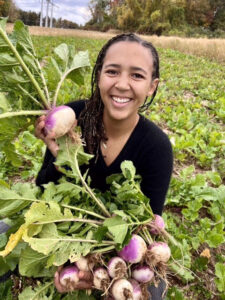 Beauty Blooms LLC is a 10-acre, woman-of-color-run farm in Silver Spring, MD that grows vegetables and flowers of primarily African heritage heirloom varieties. Beauty Bloom’s products are sold at a local farmers market and substantial quantities are donated to local food banks. Founder and Farm Manager Nia Nyamweya leases her farmland through the Montgomery Countryside Alliance’s LandLink program, whose goal is \to regenerate land that was in corn and soybean production through organic practices and cover cropping.
Beauty Blooms LLC is a 10-acre, woman-of-color-run farm in Silver Spring, MD that grows vegetables and flowers of primarily African heritage heirloom varieties. Beauty Bloom’s products are sold at a local farmers market and substantial quantities are donated to local food banks. Founder and Farm Manager Nia Nyamweya leases her farmland through the Montgomery Countryside Alliance’s LandLink program, whose goal is \to regenerate land that was in corn and soybean production through organic practices and cover cropping.
They will use their $5,000 grant to increase their capacity to grow food for the local community and boost overall soil health and pollinator support. They will purchase a 16’x100′ caterpillar tunnel that will double as a seed-starting space and extend their growing season. The land does not have access to a well, so a rain-catchment system will be installed with drip irrigation to water plants. This combination of increased plant starts, a longer growing season, and the ability to regularly water crops, instead of dry farming, is expected to boost crop yields and increase donations to people facing food insecurity. The former monoculture crops led to a lack of biodiversity that will be improved through the planting of a perennial native wildflower buffer around the farm to help increase the population of beneficial insects and pollinators.
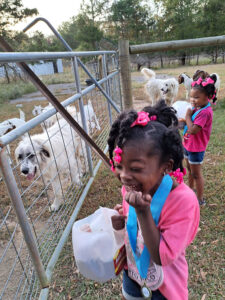 Brooks’ Family Farm is a 7-acre, multi-generational, family-owned and operated meat goat farm in Starkville, MS. Co-owner, Elmarie Brooks, is the only African American female goat farmer in the area. Brooks’ Family Farm uses minimal amounts of purchased feed and instead raises primarily-pastured Nubian and Boer goats. The farm is located in the center of a large multi-ethnic community for whom goat meat is culturally relevant. The farm is partnered with J. L. King Center, a local nonprofit organization serving low-income families and providing resources such as general education, food, clothing, training, youth development, tutoring, and exposure to new opportunities. The farm currently donates meat and provides educational opportunities to gain knowledge about goat farming.
Brooks’ Family Farm is a 7-acre, multi-generational, family-owned and operated meat goat farm in Starkville, MS. Co-owner, Elmarie Brooks, is the only African American female goat farmer in the area. Brooks’ Family Farm uses minimal amounts of purchased feed and instead raises primarily-pastured Nubian and Boer goats. The farm is located in the center of a large multi-ethnic community for whom goat meat is culturally relevant. The farm is partnered with J. L. King Center, a local nonprofit organization serving low-income families and providing resources such as general education, food, clothing, training, youth development, tutoring, and exposure to new opportunities. The farm currently donates meat and provides educational opportunities to gain knowledge about goat farming.
With a $5,000 grant, they will be able to upgrade their barn facilities with essential equipment and supplies such as a trimming stand, freestanding starter pens, and a livestock scale, as well as essential signage and supplies for group visits and farm tours.
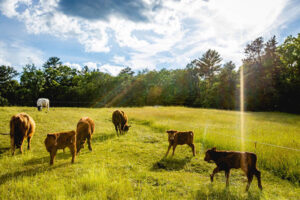 ContemPLATE is a 84-acre, non-profit farm, based in Sterling, CT that provides access to farm-based therapies for underserved demographics, especially veterans and first responders suffering from service-related disabilities such as PTSD, and at-risk youth in Connecticut and Rhode Island. Their efforts are focused on inclusiveness and regenerative agriculture through hands-on programs including homesteading 101, whole animal butchery, hide tanning, mushroom hunting, foraging, charcuterie, and fermentation.
ContemPLATE is a 84-acre, non-profit farm, based in Sterling, CT that provides access to farm-based therapies for underserved demographics, especially veterans and first responders suffering from service-related disabilities such as PTSD, and at-risk youth in Connecticut and Rhode Island. Their efforts are focused on inclusiveness and regenerative agriculture through hands-on programs including homesteading 101, whole animal butchery, hide tanning, mushroom hunting, foraging, charcuterie, and fermentation.
With a $5,000 grant, they will improve their pollination program by purchasing five new colonies of honeybees from a neighboring farm. They will establish an edible pollinator hedgerow filled with flowering plants, trees, and shrubs that will support pollinators year-round as well as provide crops. In addition, they will purchase kelp fertilizer to help the hedgerow plantings grow healthier and better resist diseases and pests.
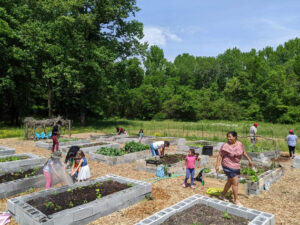 Crabtree Farms is a 22-acre community urban farm located in Chattanooga, TN that is committed to food access, education, and sustainable agriculture. The farm is located in the Clifton Hills area where neighbors are disproportionately affected by food insecurity and low access to affordable and nutrient-dense food. The farm also serves as one of a few community green spaces in the neighborhood. Crabtree Farms is a part of a regional coalition (the Southeast Tennessee Young Farmers) that works to connect farmers with the tools, resources, and people they need to build successful farm businesses. The farm itself offers year-round opportunities for community members to gain experience and knowledge in various aspects of sustainable agriculture and gardening. In this way, the farm serves as an incubator and support system for burgeoning farmers.
Crabtree Farms is a 22-acre community urban farm located in Chattanooga, TN that is committed to food access, education, and sustainable agriculture. The farm is located in the Clifton Hills area where neighbors are disproportionately affected by food insecurity and low access to affordable and nutrient-dense food. The farm also serves as one of a few community green spaces in the neighborhood. Crabtree Farms is a part of a regional coalition (the Southeast Tennessee Young Farmers) that works to connect farmers with the tools, resources, and people they need to build successful farm businesses. The farm itself offers year-round opportunities for community members to gain experience and knowledge in various aspects of sustainable agriculture and gardening. In this way, the farm serves as an incubator and support system for burgeoning farmers.
Their $4,521 grant will be used to further develop the shared field space at Crabtree Farms’ Community Garden. Regenerative practices will be used to establish multiple, no-till growing areas for both perennial and annual plants that will maximize the amount of food grown and available to community members. Beyond increased production, this project would create new habitat for pollinators, address field saturation challenges, improve overall soil health and biodiversity and bolster community involvement through a collaborative design process.
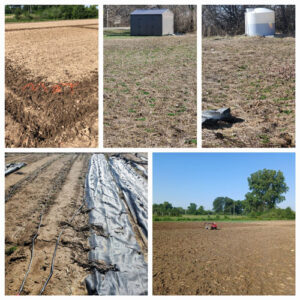 Endigo’s Herbals & Organics is a 1-acre woman-of-color-run farm in Dayton, OH that uses regenerative practices to grow squash, tomatoes, greens (collards, mustard, kale), onions, peppers, okra, swiss chard, green beans, and cucumbers. Farm-owner, Donnetta Boykin, sells her produce through direct sales, wholesalers, and three farmer’s markets in addition to donating to food pantries.
Endigo’s Herbals & Organics is a 1-acre woman-of-color-run farm in Dayton, OH that uses regenerative practices to grow squash, tomatoes, greens (collards, mustard, kale), onions, peppers, okra, swiss chard, green beans, and cucumbers. Farm-owner, Donnetta Boykin, sells her produce through direct sales, wholesalers, and three farmer’s markets in addition to donating to food pantries.
With their $5,000 grant, the farm will purchase equipment to transition growing areas to low/no-till and also add a cold storage unit to allow for proper storage of harvested crops.Transitioning to minimal or no-till will improve the health of the soil and prevent erosion, which leads to healthier produce and greater yields. This will also allow Donnetta to shift the labor and expenses associated with tilling to crop production, diversity, and expansion. The purchase of a used trailer that will be converted into a cold storage unit will allow the farm to triple production and increase the shelf life of their produce, ensuring those they serve receive the freshest produce possible.
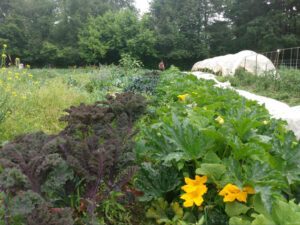 Garden-Raised Bounty (GRuB) is a 3-acre, non-profit farm, located in Olympia, WA that serves a five-county region with the only program in their area to offer hands-on outdoor education and employment programming support for youth, ages 16-24, who have left high school before graduating. Food donations are their primary crop distribution. In 2022, they donated 85% of their produce through local hunger relief programs in addition to youth taking home shares of food.
Garden-Raised Bounty (GRuB) is a 3-acre, non-profit farm, located in Olympia, WA that serves a five-county region with the only program in their area to offer hands-on outdoor education and employment programming support for youth, ages 16-24, who have left high school before graduating. Food donations are their primary crop distribution. In 2022, they donated 85% of their produce through local hunger relief programs in addition to youth taking home shares of food.
With their $4,910 grant, GRuB will relocate and expand their perennial berry production and improve weed management. Berries are their most requested crop and they currently have just a few low-yielding blueberry plants in a high-ground location that needs irrigation during summer. The grant will enable them to purchase a number of native fruiting plants and trees and transition their tilled annual vegetable beds in a wetter area of the farm to perennial berries. In addition, they will purchase a steam weeder to heat treat any noxious plant parts before they go into their compost system so they can reincorporate the weeds onsite rather than disposing of them offsite at the dump.
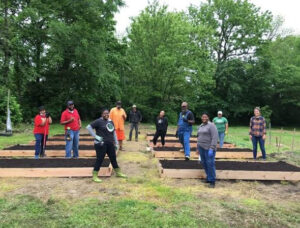 Global One Urban Farming is a 1.5-acre, non-profit farm in Kansas City, MO that produces and distributes free organic vegetables to seniors, veterans, and low-income families with the goal of raising health levels throughout Kansas City. Their team converts unused urban land into sustainable organic community vegetable gardens. They have also partnered with the Kansas City School District to teach urban farming.
Global One Urban Farming is a 1.5-acre, non-profit farm in Kansas City, MO that produces and distributes free organic vegetables to seniors, veterans, and low-income families with the goal of raising health levels throughout Kansas City. Their team converts unused urban land into sustainable organic community vegetable gardens. They have also partnered with the Kansas City School District to teach urban farming.
With their $3,100 grant, they will purchase an array of supplies and equipment including seeds, soil, mulch, and germination trays, to expand their production an additional 10,000 square feet. They anticipate that this will allow them to produce and distribute an additional 20,000 pounds of vegetables in 2023.
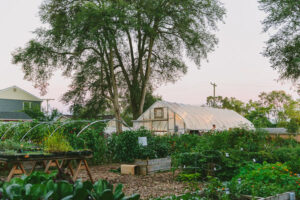 Growing Hope Urban Farm is a 2-acre, non-profit farm in Ypsilanti, MI that seeks to educate and equip community members to grow produce that is nourishing, culturally appropriate, and affordable. They offer educational programs for gardeners of all ages and levels. Produce grown is sold at their farmer’s markets and donated to their program participants and local food pantries.
Growing Hope Urban Farm is a 2-acre, non-profit farm in Ypsilanti, MI that seeks to educate and equip community members to grow produce that is nourishing, culturally appropriate, and affordable. They offer educational programs for gardeners of all ages and levels. Produce grown is sold at their farmer’s markets and donated to their program participants and local food pantries.
Their $3,782 grant will help develop a new growing space and market garden with the purchase of caterpillar tunnels, seeds, a water cistern, harvesting bins, garden carts and more. This will allow Growing Hope to expand the amount of produce grown and while also creating new space for educational opportunities such as tours, workshops, and internships. Growing Hope’s Executive Director, Julius Buzzard, said, “This growing space will allow us to grow enough produce to launch a pay-what-you-can CSA called Solidarity Shares. We will prioritize low-income households in our community who have felt the most damaging impacts of an unjust food system.”
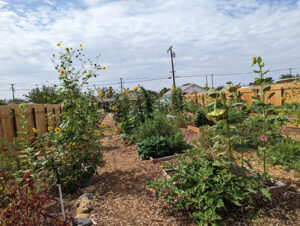 Holistic Divine Innovations is an agricultural non-profit that operates Ridgecrest Community Garden on less than an acre in Ridgecrest, CA. The garden is volunteer-run and provides fresh organic produce, education, and a space for healing and positive social engagement for many low-income families in a neighborhood that lacks easy access to healthy foods. All produce grown is distributed to the community through regular food giveaway events.
Holistic Divine Innovations is an agricultural non-profit that operates Ridgecrest Community Garden on less than an acre in Ridgecrest, CA. The garden is volunteer-run and provides fresh organic produce, education, and a space for healing and positive social engagement for many low-income families in a neighborhood that lacks easy access to healthy foods. All produce grown is distributed to the community through regular food giveaway events.
With their $3,672 grant they will purchase and install a solar-powered automatic irrigation system to efficiently water up to 50 raised beds and several fruit trees. They will also use funds to purchase fifteen flowering trees that will serve as windbreaks that protect nearby plants and crops as well as increase biodiversity at the community garden site.
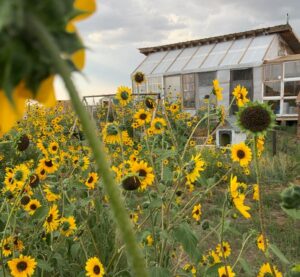 Jack Rabbit Hollow Farm is a 35-acre off-grid organic farm and animal sanctuary in Antonito, CO that uses biodynamic and permaculture-based agriculture practices such as drought tolerant plantings that enhance biodiversity, cover cropping, and rotational grazing. The farm produces fruits, vegetables, and herbs. Farmer Morgan Velasquez, said “We are surrounded by mainly traditional monoculture farms growing potatoes and hay for livestock. Most of these farms are using sprinkler systems or have senior water rights where much of the water ends up evaporating or wasted in the road. There is an uneven distribution of water in our area. We are known for our conservation mindset, land stewardship, and love of all living things.”
Jack Rabbit Hollow Farm is a 35-acre off-grid organic farm and animal sanctuary in Antonito, CO that uses biodynamic and permaculture-based agriculture practices such as drought tolerant plantings that enhance biodiversity, cover cropping, and rotational grazing. The farm produces fruits, vegetables, and herbs. Farmer Morgan Velasquez, said “We are surrounded by mainly traditional monoculture farms growing potatoes and hay for livestock. Most of these farms are using sprinkler systems or have senior water rights where much of the water ends up evaporating or wasted in the road. There is an uneven distribution of water in our area. We are known for our conservation mindset, land stewardship, and love of all living things.”
With their $4,980 grant they will purchase and install a solar-powered water pump and drip irrigation system. This will replace their existing fossil fuel generator that operates their current well pump. The addition of vapor barrier cloth will further moisture retention methods to conserve water at every step. The overall goal of the project is to take climate action by building a system powered by renewable energy that creates water resiliency and reliability enabling their farm to increase production and service their community with local healthy crops at a greater capacity.
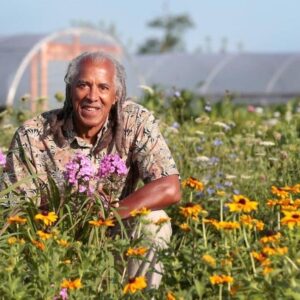 Ballew Estates LLC is a 27-acre, fifth-generation, multi-generational farm in Richmond, KY that grows fruit, berries, vegetables, herbs, and seeds. They also produce medicinal herbs and honey for sale and frequently host educational workshops, retreats, tours, and school/community pollinator projects. Farmer Jim Embry is a noted permaculture expert and Slow Food proponent.
Ballew Estates LLC is a 27-acre, fifth-generation, multi-generational farm in Richmond, KY that grows fruit, berries, vegetables, herbs, and seeds. They also produce medicinal herbs and honey for sale and frequently host educational workshops, retreats, tours, and school/community pollinator projects. Farmer Jim Embry is a noted permaculture expert and Slow Food proponent.
They will use their $4,996 grant to purchase three additional beehives and a bee nuc that will expand their honey production and the diversity and quantity of bees on the farm. They will also add to their established pollinator conservation project by purchasing new varieties of native pollinator mixes with an emphasis on Milkweeds, which are hosts for Monarch Butterflies, and Sunflowers, which provide some resistance to varroa mites that harm bees, as well as diversifying their types of clover, milkweed, grasses and mints. In addition, they will purchase two bat houses for natural pest control, and 50 packages of heirloom vegetable and culturally-relevant seeds for planting and seed saving. They will also install a combined solar and wind generating system to provide power for their micro-irrigation system and to their bee house.
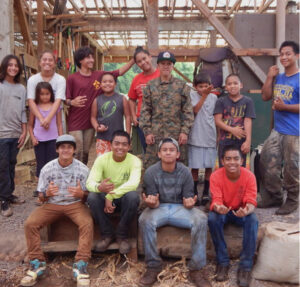 Kahua Pa’a Mua is a 2-acre agricultural nonprofit in Kapaau, HI. Kahua Pa’a Mua means “to build a strong foundation.” Their mission is to “enhance communities through economic, conservation/preservation, social and educational programs for youth and adults.” Their farming programs produce taro, red and green onion, long beans, kale, cabbage, eggplant, okra, tomatoes, spices, medicinal herbs, and cut flowers. In addition, they raise pigs, chickens, and rabbits for meat and eggs. They distribute food amongst vulnerable communities and food banks in the area. Kahua Pa’a Mua provides resources for families to grow their own food and nurtures agricultural entrepreneurship and primarily serves youth and adults of Hawaiian ancestry.
Kahua Pa’a Mua is a 2-acre agricultural nonprofit in Kapaau, HI. Kahua Pa’a Mua means “to build a strong foundation.” Their mission is to “enhance communities through economic, conservation/preservation, social and educational programs for youth and adults.” Their farming programs produce taro, red and green onion, long beans, kale, cabbage, eggplant, okra, tomatoes, spices, medicinal herbs, and cut flowers. In addition, they raise pigs, chickens, and rabbits for meat and eggs. They distribute food amongst vulnerable communities and food banks in the area. Kahua Pa’a Mua provides resources for families to grow their own food and nurtures agricultural entrepreneurship and primarily serves youth and adults of Hawaiian ancestry.
They will use their $5,000 grant to construct a water catchment system for their Palili’o Learning Lab farm where their Ohana Agriculture Resilience Program (OAR) and Ho’okahua Ai (HA) Youth Mentorship Program grows vegetables on two, irrigated 100-foot crop beds, while attending workshops on soil and seed prep, irrigation, fencing, Korean Natural Farming fertilizer inputs, soil remediation, poi-making, Hawaiian medicinals, aquaponics, and animal husbandry. A rockslide in 2021 destroyed a plantation-era irrigation system that previously brought water to the farm. Water costs increased from $40 bi-monthly to $750 bi-monthly. This sustainable and affordable water system will allow them to continue and expand local food production, reduce use of groundwater resources, and teach program participants about water catchment systems, so they can look into it for their own home use.
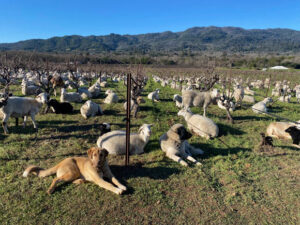 Perennial Grazing is a 70-acre farm and pasture in Rumsey, CA that grows table grapes and raises meat ducks and sheep and specializes in regenerative grazing services. They bring their sheep to graze farms, vineyards, and orchards throughout northern California to reduce wildfire fuel and naturally re-propagate native grasses and reduce invasive plant species through grazing, which also improves soil health without herbicides, tillage, or irrigation.
Perennial Grazing is a 70-acre farm and pasture in Rumsey, CA that grows table grapes and raises meat ducks and sheep and specializes in regenerative grazing services. They bring their sheep to graze farms, vineyards, and orchards throughout northern California to reduce wildfire fuel and naturally re-propagate native grasses and reduce invasive plant species through grazing, which also improves soil health without herbicides, tillage, or irrigation.
They will use their $4,750 grant to purchase a portable corral system to allow them to reach a greater number of clients in the northern California grasslands community. California’s record drought and wildfires has increased demand from landowners looking to manage vegetation for fire safety, hold more water in their soil, bring natural fertility to their soil, avoid tilling, and use sheep to perform vegetation management and manage invasive species such as the yellow star thistle.
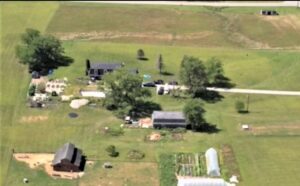 Prairie Hills Farm is a 7-acre farm in Selma, IN that grows around 20 different fruits and vegetables using organic practices, in addition to raising pasture-fed goats, chickens, and turkeys. Farmers Sylvester and Sabrina Friend have partnered with local schools, youth groups, and agricultural organizations to share their gardening and farming knowledge with the community.
Prairie Hills Farm is a 7-acre farm in Selma, IN that grows around 20 different fruits and vegetables using organic practices, in addition to raising pasture-fed goats, chickens, and turkeys. Farmers Sylvester and Sabrina Friend have partnered with local schools, youth groups, and agricultural organizations to share their gardening and farming knowledge with the community.
With their $4,945 grant, the Friends will be able to extend their growing season by constructing hoop houses on their raised planting beds, reduce water waste by installing a drip irrigation system, and purchase gardening tools and supplies for a youth farming program. Hoop houses will extend their growing season by four to six weeks. The irrigation system will allow the farm to recoup about two hours a day during the primary growing season, while reducing water waste by roughly 30%. Partnering with a local school, about 60 students will take part in their introduction to farming curriculum and have hands-on experience relating to farming.
Sankofa Way Youth Garden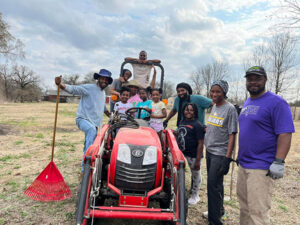 is a 1-acre urban agricultural nonprofit in Waco, TX that connects the local community, especially youth, with the power of growing their own food. The farm produces crops such as okra, mixed herbs, tomatoes, peppers, sweet potatoes, bok choy, broccoli, onions, collards, peas, and melons.
is a 1-acre urban agricultural nonprofit in Waco, TX that connects the local community, especially youth, with the power of growing their own food. The farm produces crops such as okra, mixed herbs, tomatoes, peppers, sweet potatoes, bok choy, broccoli, onions, collards, peas, and melons.
They will use their $4,339 grant to nurture local youth through the planning, installation, planting, and harvesting of four keyhole gardens. Keyhole gardens are a sustainable farming system originally developed in Africa that allows for growing in small spaces. Each round garden has a notch for access and a compost in the center that nourishes the plants. Worm gardens will be used to improve and teach the importance of soil health and biodiversity. Their harvests will be shared with those who lack fresh food access through the Waco National Women in Agriculture Association.
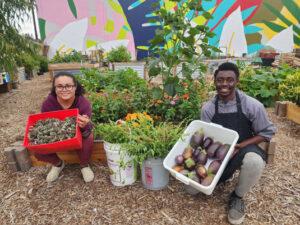 Sowing Seeds of Change is a 1-acre nonprofit urban farm and community garden in Long Beach, CA that grows organic produce, employs transition-age people with disabilities and foster youth (ages 18-22) through a job-readiness program, and hosts free gardening workshops. Program participants gain hands-on experience in every facet of the growing process from seed to harvest, then learn market and customer service skills while distributing the produce at their no-cost farmer’s market that benefits neighbors experiencing food insecurity.
Sowing Seeds of Change is a 1-acre nonprofit urban farm and community garden in Long Beach, CA that grows organic produce, employs transition-age people with disabilities and foster youth (ages 18-22) through a job-readiness program, and hosts free gardening workshops. Program participants gain hands-on experience in every facet of the growing process from seed to harvest, then learn market and customer service skills while distributing the produce at their no-cost farmer’s market that benefits neighbors experiencing food insecurity.
They will use their $4,762 grant to build six more planter boxes, which will grow food for the local community, and two ADA-compliant planter boxes to ensure that young adults with special mobility needs can access their training program; and purchase fruit trees and supplies to complete an expanded pollinator garden and tree hedge.
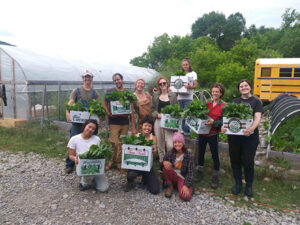 Unadilla Community Farm Education Center Inc. is an 11-acre nonprofit farm and permaculture education center in West Edmeston, NY dedicated to providing education and training in sustainable agriculture and providing access to fresh produce for low-income and low-access communities. Their off-the-grid center grows 200+ varieties of annual and perennial cold-hardy fruits, vegetables, mushrooms, and herbs.
Unadilla Community Farm Education Center Inc. is an 11-acre nonprofit farm and permaculture education center in West Edmeston, NY dedicated to providing education and training in sustainable agriculture and providing access to fresh produce for low-income and low-access communities. Their off-the-grid center grows 200+ varieties of annual and perennial cold-hardy fruits, vegetables, mushrooms, and herbs.
They will use their $5,000 grant to convert their existing solar-powered irrigation system from overhead sprinklers to drip irrigation, which could conserve up to 50% of current water usage. Drip irrigation also promotes plant health by keeping plants’ above ground parts dry. The use of timer valves will also greatly reduce the amount of labor required for irrigation.
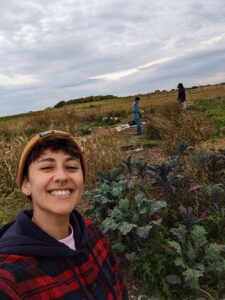 We Have Always Been Related (WHABR) is a 1-acre, non-profit farming collective in Milwaukee, WI. WHABR collective member, Chalchiuhkoatl Kardós, described the farm as, “an intentional intergenerational collective of two-spirit, queer, trans, nonbinary and gender expansive (2SQTNBGE) BIPOC earthworkers villaging up to take care of one another and reclaim, remember, and regenerate our traditional roles, responsibilities, knowledges, visions, and medicines within our communities.” Their work is rooted in regenerative practices such as restoring soil health and ancestral knowledge and wisdom to steward the land.
We Have Always Been Related (WHABR) is a 1-acre, non-profit farming collective in Milwaukee, WI. WHABR collective member, Chalchiuhkoatl Kardós, described the farm as, “an intentional intergenerational collective of two-spirit, queer, trans, nonbinary and gender expansive (2SQTNBGE) BIPOC earthworkers villaging up to take care of one another and reclaim, remember, and regenerate our traditional roles, responsibilities, knowledges, visions, and medicines within our communities.” Their work is rooted in regenerative practices such as restoring soil health and ancestral knowledge and wisdom to steward the land.
Their $4,999 grant will be used to purchase a variety of supplies and equipment such as compost, a soil PH meter, straw, rice hulls. In addition, the grant will provide seven low-income, 2SQTNBGE BIPOC families a full season’s share in their CSA program, which includes four farm visits and two community meals prepared by one of their member chefs with ingredients sourced from the farm.
We are excited to see our 2023 grantees successfully kick off their projects. Grantees will provide regular informal project updates, as well as submitting a formal interim report in August and a final progress report in January 2024. We look forward to seeing their projects realized and hearing stories about the impacts on their farms and their communities.
Join the Chief Banana newsletter for weekly fruit facts, workplace wellness ideas, and occasional offers.
"*" indicates required fields
By signing up, you agree to receive emails from The FruitGuys. You can unsubscribe anytime.
Keep exploring.
Browse by theme.
Get easy recurring deliveries for break rooms, micro markets, and more.
Take advantage of faster checkouts and other great benefits.
Create an AccountWe are here to help you provide healthy food, meaning, and a reason to gather in your workplace.
From weekly mixed fruit for break rooms to monthly gifts for remote staff to special projects, we can serve your needs or turn your dreams into a nourishing reality.
Get fruit news, snack tips, and office wellness insights in your inbox each week, fresh from the desk of our CEO (aka Chief Banana)!
"*" indicates required fields

